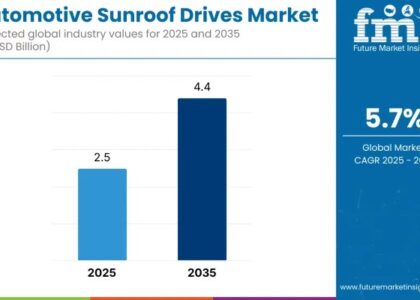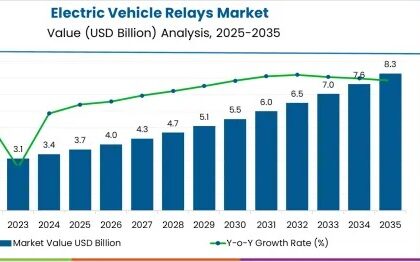The global helicobacter pylori non-invasive testing market is set to witness consistent expansion over the next decade, driven by the rising prevalence of H. pylori bacterial infections, increasing governmental awareness for accurate diagnosis, and the continuous launch and approval of advanced diagnostic tools. According to recent market insights, the sector is expected to grow at a compound annual growth rate (CAGR) of 4.4%, reaching USD 1000.57 million by 2033, up from USD 650.50 million in 2023.
Helicobacter pylori is a common bacterium linked to various gastrointestinal conditions such as gastric cancer, duodenal ulcers, and peptic ulcers. As awareness surrounding these diseases intensifies and demand for early, non-invasive diagnostic options rises, stakeholders across the healthcare value chain are eyeing this market as a hub for innovation and investment.
Explore Emerging Market Insights: Request a Sample Report Now! https://www.futuremarketinsights.com/report-sample#5245502d47422d3135383233
Growth Drivers: Diagnostics Innovation, Awareness, and Regulatory Support
A key catalyst behind the market’s upward trajectory is the surge in H. pylori infection rates globally. According to recent health reports, nearly 50% of the world’s population may be infected with H. pylori, often without clear symptoms. This silent threat has made non-invasive testing essential for early detection and management.
Moreover, governments across the globe are increasing their efforts to raise public awareness and encourage routine screenings, particularly in high-risk populations. In parallel, regulatory bodies like the U.S. Food and Drug Administration (FDA) continue to support the development and approval of new testing technologies.
In a noteworthy advancement, Meridian Bioscience, Inc. received FDA approval in March 2020 for its Curian and Curian HpSA assay—tools designed to improve speed and accuracy in gastrointestinal diagnostics. Likewise, Thermo Fisher Scientific expanded its research and development capabilities with its acquisition of PPD, Inc. for USD 17.4 billion in 2021, signaling its commitment to advancing diagnostics solutions across multiple disease areas, including H. pylori.
Market Challenges: Detection Complexity and Regulatory Barriers
Despite promising growth, the market does face certain restraints. The absence of clear symptoms in many H. pylori cases, coupled with limitations in detection accuracy, can make timely diagnosis challenging. Additionally, stringent regulatory environments in some regions may delay product approvals and commercialization efforts.
Yet, experts emphasize the importance of continued screening and diagnosis. Although no direct link has been established between COVID-19 and H. pylori, healthcare professionals continue to recommend timely testing and treatment, particularly among vulnerable patient groups.
Key Takeaways: Helicobacter Pylori Non-Invasive Testing Market
- United States Market Dynamics:
- North America leads the global Helicobacter pylori (H. pylori) non-invasive testing market, with the U.S. at the forefront.
- Growth is driven by the rising incidence of stomach-related conditions and advancements in healthcare infrastructure.
- Approximately 30–40% of Americans are infected with H. pylori, with higher prevalence among Hispanic and Black populations due to socioeconomic factors.
- The U.S. is witnessing declining eradication rates (~75%) due to rising antibiotic resistance, particularly to Clarithromycin and Metronidazole.
- China Market Insights:
- China dominates the H. pylori non-invasive testing market in Asia-Pacific, supported by a robust pharmaceutical and biotechnology sector.
- High prevalence of H. pylori and gastric cancer cases is fueling innovation and development of diagnostic tools by local and international firms.
- Japan Market Characteristics:
- Japan faces one of the highest stomach cancer mortality rates globally, with 98% of cases linked to H. pylori infection.
- Dietary habits and widespread infection have led to increased focus on early detection.
- These factors are expected to significantly boost market demand for non-invasive H. pylori testing in the coming years.
High Demand for Market Insights: Discover Comprehensive Trends in Our Full Report! https://www.futuremarketinsights.com/reports/helicobacter-pylori-non-invasive-testing-market
Competitive Landscape: Innovation and Strategic Partnerships Drive Momentum
The global helicobacter pylori non-invasive testing landscape remains highly competitive, with key players focusing on innovation, strategic partnerships, and regulatory approvals to maintain market leadership. Prominent players include:
- DiaSorin S.p.A.
- Meridian Bioscience, Inc.
- Exalenz Bioscience Ltd.
- Alere
- Thermo Fisher Scientific
- Biomerica, Inc.
- Certest Biotec S.L.
- Sekisui Diagnostics
- CorisBioconcept SPRL
- Shenzhen Zhonghe Headway Bio-Sci & Tech Co., Ltd.
These companies are not only expanding their product portfolios but also collaborating with diagnostic labs and healthcare providers to improve accessibility and efficiency of H. pylori testing solutions across various settings.
Market Segmentation: Detailed Overview
The helicobacter pylori non-invasive testing market is segmented as follows:
By Non-invasive Test Type:
- Serology Test
- Stool Antigen Test
- Urea Breath Test
By Test Type:
- Laboratory-based Tests
- Point-of-Care Tests
By End-user:
- Hospitals
- Diagnostic Labs
- Clinics
By Region:
- North America
- Latin America
- Asia Pacific
- Middle East and Africa (MEA)
- Europe
Among these, urea breath tests and stool antigen tests are gaining significant traction due to their non-invasiveness, ease of use, and diagnostic accuracy. Point-of-care testing is also emerging as a vital segment, especially in under-resourced or remote healthcare settings.
Download Our Comprehensive Healthcare Industry Report! https://www.futuremarketinsights.com/industry-analysis/in-vitro-diagnostics-devices
Future Outlook
As the global healthcare industry continues to prioritize early diagnosis, preventive care, and patient-centric approaches, the demand for non-invasive H. pylori testing is expected to rise steadily. With sustained support from regulatory bodies, a growing aging population, and increased focus on gastrointestinal health, the market is poised for long-term success.
Market participants are urged to invest in R&D, public-private partnerships, and global market expansion strategies to harness the full potential of this growing space. The convergence of diagnostic innovation and increasing patient awareness makes the coming decade a pivotal period for the helicobacter pylori non-invasive testing market.




